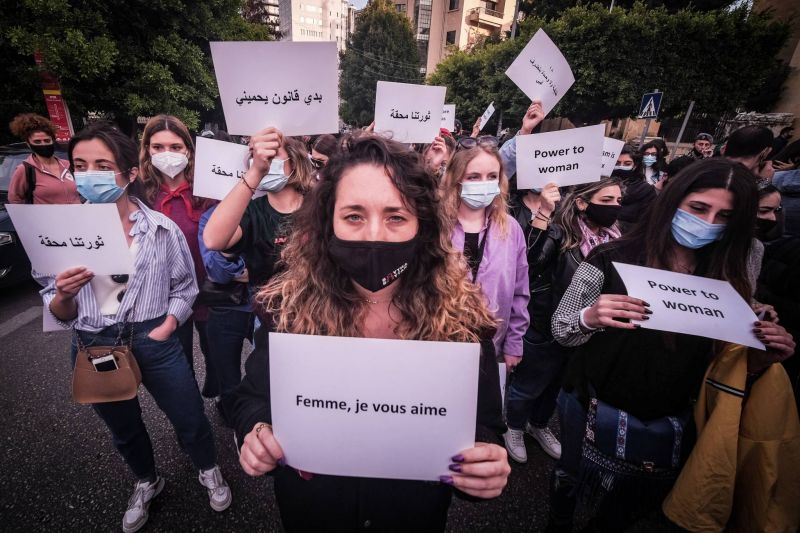
Women protest in Beirut. (Credit: João Sousa/L'Orient Today)
“Gender equality is growing more distant. On the current track, UN Women puts it 300 years away,” United Nations Secretary-General António Guterres said in a general assembly speech this week.
And although regular rankings show strong disparities in progress between the planet’s countries and regions, let’s not fool ourselves — no country in the world is on track to achieve gender equality by 2030, i.e. in line with the 2030 Agenda for Sustainable Development.
It is likely unsurprising that Lebanon fares badly: it ranks 119th among 146 countries in the 2022 Global Gender Gap Report.
Just eight women hold seats in Parliament (out of a total of 128 MPs) and only one woman serves as a minister (out of a total of 24) in Lebanon’s current cabinet.
Women still cannot pass the Lebanese nationality to their children. There is no unified personal status law, which means that all affairs related to marriage, divorce, child custody, inheritance and even the age of legal marriage are left to the country’s various religious courts, which reach their verdicts based on 15 personal status laws. Child marriage continues to exist, as some religious courts allow girls to marry as young as 14 years old.
And according to the World Bank, female labor force participation in Lebanon stood at 21 percent in 2021. This compares to a global rate of just over 50 percent for women and 80 percent for men.
Yet in recent years, some progress has been made, most notably a law criminalizing sexual harassment was passed on Dec. 21, 2020.
Worldwide, while there has been progress in recent decades, women and girls around the world still do not fully enjoy equal rights and opportunities. Moreover, the social and economic fallout from the COVID-19 pandemic, climate change and the backlash against abortion rights have in some instances reversed previous advances.
Violence against women remains endemic and goes well beyond the high-profile international cases (Iran, Ukraine, Afghanistan) that continue to make headlines. Meanwhile, gender discrimination and biases permeate every aspect of our societies, from education to health, business, to politics.
The news media plays a crucial role not only in denouncing attacks on women’s rights but also in highlighting new possible narratives and supporting the profound cultural shift needed for women to enjoy the right to live free from violence and discrimination. It starts with the news media giving the full picture. This means raising awareness about issues related to gender inequality, of course, but also including more voices and the perspectives of women wherever they are from, going beyond social and cultural stereotypes and showing how women can also be powerful agents of change.
This is why, to mark International Women’s Day, L’Orient Today and L’Orient-Le Jour have joined forces with 13 news outlets from around the world, as part of the Sparknews network, to cover gender-based global issues and to focus on the women, men, NGOs, citizen movements and policies tackling the gender gap, as well as to look at the impact empowering women can have on wider issues. Stitched together, these initiatives, these stories that we will publish throughout this week show that gender equality should not remain a distant dream. And they demonstrate that there are people, all over the world, continuing to fight for change.